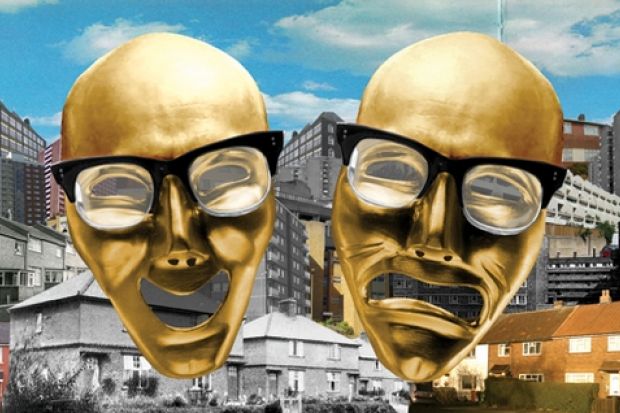Michael Collins and Harry Hill are both bald and wear black spectacles; but they could not be more different. They are the contemporary masks of tragedy and comedy. Michael looks sad whereas Harry looks happy. Harry shows he's happy either by disappearing down his enormous shirt collar or by jacking up his eyebrows until they join in the centre of his scalp, giving the appearance of a comb-over. If he's very happy, he tries to do both. As this is a physical impossibility, it results in serious injury, which is why we must get along without TV Burp until the autumn.
Harry's glasses, shaped like a television set, allow him to see only a world of light entertainment. He needs to be enlightened. If only Michael could whisper in his ear: I've seen things you wouldn't believe. Politicians creating decent housing in Dagenham, people caring for their communities in Barking. All these moments will be lost in time, like tears in rain. There are no tears in Harry's universe, only laughter. The world is turning into a studio, democracy into a clap-o-meter.
Which has probably got nothing at all to do with the change in British housing policy over the past hundred years. But then again, everything is connected. The Great Estate: The Rise and Fall of the Council House (BBC Four, Thursday 14 April, 8pm) recalled a time when clearing slums showed that there was such a thing as society, not merely a collection of individuals so desperate for applause they'll juggle tarantulas or drop a scorpion down their underpants. In the 1890s, councils were given an option and then later had a duty to provide housing for the working class using money from the rates and from central government. The houses themselves were well designed. Sinks were placed under windows so that mothers could keep an eye on their children playing in the street. The first inhabitants marvelled at what seemed palaces of luxury: a garden, a bathroom, light at the flick of a switch.
But modern conveniences carried responsibilities. Windows were to be cleaned once a week, chimneys once a month, there was to be a 12-inch gap between lino and the wall, and laundry had to be dried out of public view. Michael sighed. It all seemed very regimented. And yet isn't it preferable to cars propped up on bricks in a tussocky bit of wasteland? After the Second World War, the term "working class" was dropped from legislation on council houses. From now on, they were to be for all. But it didn't happen. Badly built tower blocks, the loss of neighbourhoods, and poorly thought-out changes to tenancy agreements spelled the end of one of the greatest experiments in British social history. The film was all the more moving for being filtered through Michael's own childhood in the Heygate estate in Southwark, South London. His past is now due for demolition. No wonder he exudes gloom.
SuperScrimpers: Waste Not Want Not (Channel 4, Wednesday 13 April, 8.30pm) gives tips on how to save money. Margaret recommended using hair conditioner to clean shoes instead of polish. But is buying twice as much Pantene cheaper than one tin of Kiwi? Here's my tip. Buy shoes that don't need a brush or a duster. Mrs Moneypenny, a columnist on the Financial Times, cycles round the capital advising hapless couples on how they can be more thrifty. If they can tear their eyes from her orange trilby and concentrate on the advice she is giving, they may just scrape together a deposit for their house. There were no men in the programme, which made you wonder why a woman isn't Chancellor of the Exchequer. Barbara, who said that she could do "an awful lot of things with a lemon", would get my vote.
"Hello, I'm Bill Bailey." Bill is stalking several troops of baboons in South Africa (Baboons with Bill Bailey, ITV1, Friday 15 April, 8pm). He identifies strongly with one called Clint and indeed there is a resemblance, except Clint has more fur and doesn't feel the same need to invade Bill's privacy as Bill does his. A commercial break brings welcome relief but it's over too quickly. "Hello, I'm Bill Bailey," says Bill again in case we'd forgotten his name during the adverts. This time Bill's attention is on a baboon called James Dean, who managed to escape his tormentor only by breaking into someone's house.
Frank Skinner asked his audience what they would like to discuss (Frank Skinner's Opinionated, BBC Two, Friday 15 April, 10pm), then took no notice of their suggestions. But he felt compelled to ask for their help when trying to explain happiness. Some said it was doing good. Others said that it was counting your blessings. No one said it was watching Harry Hill. So now you know.
Register to continue
Why register?
- Registration is free and only takes a moment
- Once registered, you can read 3 articles a month
- Sign up for our newsletter
Subscribe
Or subscribe for unlimited access to:
- Unlimited access to news, views, insights & reviews
- Digital editions
- Digital access to THE’s university and college rankings analysis
Already registered or a current subscriber? Login
